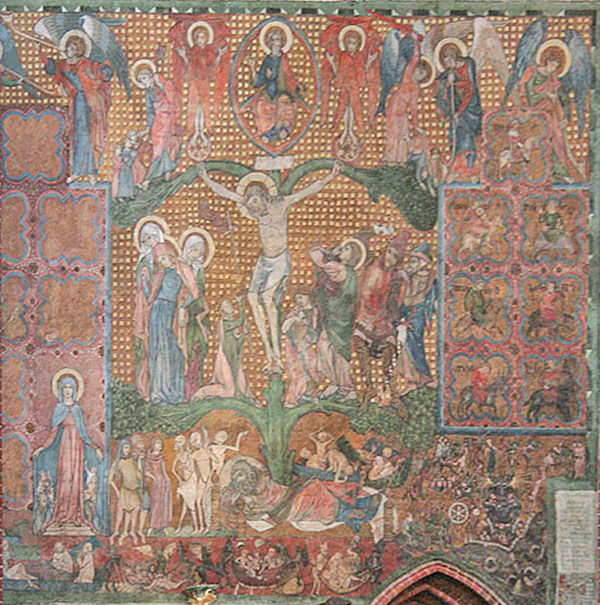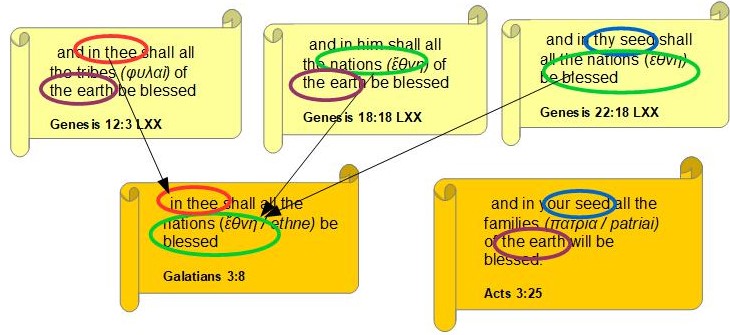
Who bewitched you? Paul demanded to know of the Galatians. He continued:
Before your very eyes Jesus Christ was written beforehand [προεγράφη, cf Rom. 15:4] as crucified.
Max Wilcox suggested (with some diffidence) at least the possibility of such a translation back in 1977 in an article published in the Journal of Biblical Literature. The remainder of this post draws a few key points from a mass of fascinating details in that article, “Upon the Tree”: Deut 21:22-23 in the New Testament”. It focuses on what Paul and other early “Christian” exegetes found written in the Scriptures through a midrashic type reading.
A few verses after that opening Paul “bizarrely” links Jesus Christ with the pronouncement of a curse on anyone “hanging on a tree” as per the law of Deuteronomy. Galatians 3:13:
Christ redeemed us from the curse of the law by becoming a curse for us. For it is written: “Cursed is everyone who is hung on a tree.”
quoting Deuteronomy 21:23
. . . anyone who is hung on a tree is under God’s curse . . .
Look at that Deuteronomy 21 passage in full and despair at trying to find any way Paul could have associated it with the crucified Jesus:
If a man has committed a sin worthy of death and he is put to death, and you hang him on a tree, his corpse shall not hang all night on the tree, but you shall surely bury him on the same day (for he who is hanged is accursed of God), so that you do not defile your land which the LORD your God gives you as an inheritance. (Deut 21:22-23)
Wilcox finds clues to the association in the verses leading up to Galatians 3:13. If we are aware of the Scriptures Paul has been alluding to in those preceding verses we can find the answer to why the Deuteronomic tree-hanging curse applied to Jesus.
Look at Galatians 3:8-9
Now Scripture, having seen beforehand that God would justify the Gentiles by faith, proclaimed the good news of this in advance to Abraham in the promise, “In you shall all the nations be blessed.”
So then, those who are ‘of faith’ are blessed with faithful/believing Abraham.
For Wilcox the above passage looks very much like a mixed quotation based on three passages in a Greek translation of Genesis (Notice that Peter is assigned a similar quotation in Acts: the major difference being that in Acts the stress is on “seed” while in Galatians it is on “you”, referring to Abraham.)
(Notice that Peter is assigned a similar quotation in Acts: the major difference being that in Acts the stress is on “seed” while in Galatians it is on “you”, referring to Abraham.)
Wilcox comments that Paul (and the author of Acts) are using a hybrid quotation to associate the promise to Abraham with the “nations”, the Gentiles.
Not only Genesis but Deuteronomy informs Paul’s thought
In Galatians 3:10 we begin to read a longer section of the cursing and blessing dichotomy. This motif comes from many passages throughout Deuteronomy. Galatians 3:10 even directly quotes Deuteronomy:
| Galatians 3:10 | Deuteronomy 27:26 |
| . . . for it is written, “Cursed be everyone who does not abide by all things written in the Book of the Law, and do them.” | Cursed be he that confirmeth not the words of this law to do them. . . . |
But why does Paul veer towards the “cursed is everyone hanging on a tree” passage when that passage is surely meant to apply to blasphemers and other sinners of the worst kind? Continue reading “How Paul Found Christ Crucified – “on a Tree” – In the Scriptures”

